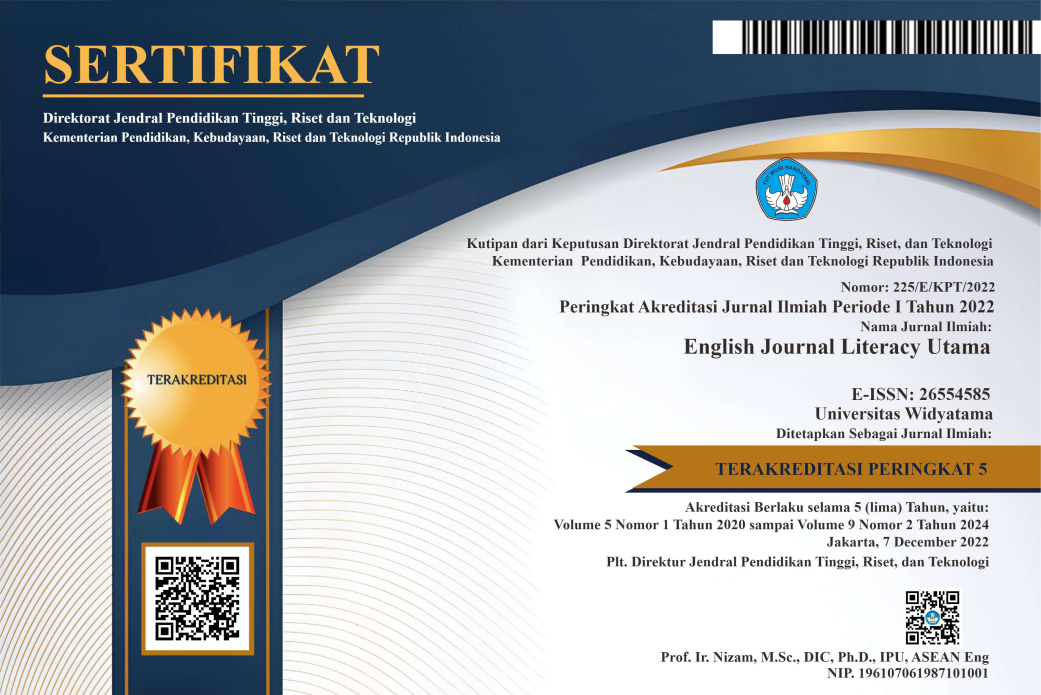The Roles of Past Participles in Nominal Modification
DOI:
https://doi.org/10.33197/ejlutama.v9i1.274Keywords:
nominal modification, past participle, processAbstract
This study explores the roles of past participles in nominal modification within the perspectives of functional grammar, focusing on their usage in an accounting textbook. Past participles frequently appear in nominal groups, functioning as epithets, classifiers, or qualifiers, depending on their role in describing or categorizing the noun. Using a qualitative approach, this research analyzes data extracted from the textbook to classify past participles based on their functions and the frequency of usage in the text. Based on the data reveal that past participles predominantly function as qualifiers, providing detailed, context-specific information about the noun in post-modification. Classifiers are moderately frequent, categorizing nouns into specific technical subsets, while epithets are the least common, offering subjective or evaluative descriptions. The key finding in this study demonstrates that the types of process associated with past participle provide effective means of distinguishing its functional role in nominal modification. Past participles derived from mental processes tend to function as epithets, while those from material processes serve as both classifiers and qualifiers.
References
Bloor, Thomas and Bloor, Meriel. (2004). The Functional Analysis of English, Second Edition. London: Hodder Education.
Downing, Angela. and Locke, Philip. (2006). A University Course in English Grammar. New York: Routledge.
Eggins, Suzanne. (2004). An Introduction to Systemic Functional Linguistics. New York: Continuum Internetional Publishing.
Gerot, Linda. and Wignell, Peter. (1995). Making Senses of Functional Grammar – An Introduction Workbook. Syndey: Gerd Stabler Antipodean Educational Enterprises.
Halliday, M.A.K. and Matthiessen, Christian. (2004). An Introduction to Functional Grammar, Third Edition. London: Edward Arnold.
Ismail Dede. and Dahlia, Anum. (2024). How the Participants in Mental Processes Involving the Verbs “Make,” “Take,” and “Have” Represent the Meaning of Clauses: Grammatical Metaphors in a Functional Grammar Study. English Journal Literacy Utama, 8(1), 16-26. https://doi.org/10.33197/ejlutama.vol8.iss1.2023.2655.455
Nieto-Cruz, M. C. (2019). The Role of Systemic Functional Grammar in the Expansion of Nominal Groups. Teachers’ Professional Development, 21(2), 97-112. https://doi.org/10.15446/profle.v21n2.
Rahayu, Sita Hediyati & Efransyah. (2020). Transitivity in the Ten Grade Students’ Recount Text: SFG. Professional Journal of English Education, 3(3), 401-407. Dikutip dari https://www.academia.edu/65376472/Transitivity_in_the_Tenth_Grade_Students_Recount_Texts_A_Systemic_Functional_Grammar_SFG
Ruan, Zhoulin. (2016). A Corpus-Based Functional Analysis of Complex Nominal Groups in Written Business Discourse: The Case of “Business”. International Journal of Computer-Assisted Language Learning and Teaching, 6(2), 74-90. DOI: 10.4018/IJCALLT.2016040105
Sujatna, Eva Tuckyta Sari, and Wahyuni, Sri. (2017). Nominal Group as Qualifier to ‘Someone’. English language Teaching: Canadian Center of Science and Education, 10(7), 257-266. Dikutip dari https://files.eric.ed.gov/fulltext/EJ1146668.pdf
Tian, Miao and Zhang, Yuxin. (2023). Exploring Nominalization in Academic Writing: A Comparative Study of Shipbuilding and Oceanography Engineering and Linguistics. 10, 1-21 https://doi.org/10.30958/ajp.X-Y-Z 1
Downloads
Published
Issue
Section
License
Copyright (c) 2025 Anum Dahlia, Dede Ismail

This work is licensed under a Creative Commons Attribution-NonCommercial-ShareAlike 4.0 International License.
Creative Commons Attribution-ShareAlike 4.0 International License















